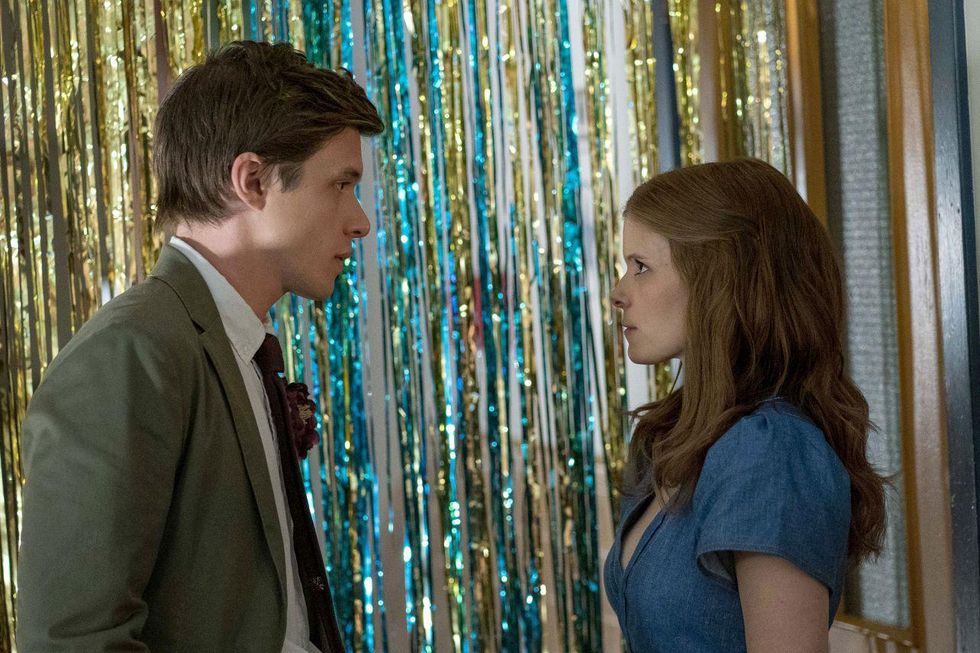
Nick Robinson and Kate Mara in "A Teacher"
via Hulu
**Content Warning: Mentions of sexual abuse, grooming, and predation.**
There is no shortage of cultural tropes involving a high school jock lusting over his hot teacher.
From Van Halen’s iconic “Hot for Teacher” to countless plots in romance novels and adult movies, we’ve been conditioned to see an affair between a young male student and an older female teacher as a victory for the student, not as an exploitative act of predation on the teacher’s part.
Hulu’s new drama A Teacher seeks to undo this conditioning. The 10-episode series is an adaptation of Hannah Fidell’s 2013 indie film of the same name. While the film is a mere hour and fifteen minutes, the show’s total run time is almost triple that length, leaving plenty of time to really get into the gritty details of the affair between barely 18-year-old Eric Walker (Nick Robinson) and Claire Wilson (Kate Mara), his 30-something-year-old English teacher.
A Teacher Official Trailerwww.youtube.com
In the first few episodes, the show teeters on the brink of being a sexy, HBO-style portrayal of a raunchy fantasy. We see Claire, married to her college boyfriend and trying to get pregnant as she begins her new teaching job, becoming bored with her life. For Eric’s part, his crush on his new teacher is evident, and he goes out of his way to put himself in situations where he can be close to Claire, once even calling her to pick him up from a house party in the middle of the night.
The show goes into very little detail about Claire’s motivation for beginning the affair, but we get an alternating sense that she is fully intellectually aware of what she’s doing and yet she’s operating almost entirely blindly, just following impulse.
In creating these murky waters, the show does a good job of showing that many sexual predators aren’t clear-cut villains with premeditated bad intentions, but rather broken, everyday people who don’t even realize they’re predators themselves. This, of course, makes them no less predatory, but it does make them harder to spot and explains why Eric never considers the possibility that what he’s experiencing with his teacher is abuse while it is happening.
For all its semi-gratuitous sex scenes, the show does do a good job of portraying the subtleties of grooming and predation. Were the power dynamic between the two even remotely equal, one could certainly argue that Eric is doing much of the pursuing. But in reality, while the lines Claire crosses with Eric in early episodes aren’t necessarily blatant, they embody some classic examples of grooming behavior.
Most experts agree that the classic steps of grooming a child for sexual abuse are:
1. Targeting the child
2. Gaining the child’s and/or caregiver’s trust
3. Filling a need
4. Isolating the child
5. Sexualizing the relationship
6. Maintaining control.
Firstly, we see Claire taking interest in Eric, going out of her way to engage him in conversation in a way she doesn’t with her other students. She then offers to be his SAT tutor for free when he mentions that he can’t afford one, and she takes him on a special trip to visit the college he hopes to attend, filling a need of his and making him feel increasingly indebted to her. Plus, this has the added benefit of gaining his mother’s trust, who is of course thrilled that a teacher is taking special interest in helping her son achieve his goals.
She also begins to offer him small gestures to make him feel special, quickly assuring him he can call her Claire, not Mrs. Wilson, and using her brother’s sway as a police officer to get him out of trouble at a house party. After the house party, she also implies to Eric that her help is a secret just between the two of them, quickly establishing an expectation of secrecy in their relationship. We also see her lying to her husband about her tutoring sessions with Eric, implying that her intentions were never just academic, despite her claims that she never meant to begin an affair with Eric.

The show artfully shows how thoroughly Claire convinces Eric (and perhaps herself) that the affair was his idea, making it seem so consensual at first that even the audience can’t help but to question if there is really anything that bad about the relationship.
After all, Eric kisses her first, which she responds to with a sharp admonishment…until later recanting and swearing him to secrecy before engaging in sexual intercourse with him. As the affair progresses, she reminds him over and over how much she is risking to be with him, effectively maintaining control.
Still, the actors themselves appear so close in age and the sex scenes show such enthusiastic consent from both parties that in the beginning of the show it’s easy to forget just how wrong the relationship is. In fact, I spent much of the first few episodes angry that Hulu would make such a steamy show about something so dangerous. But, the show soon proved that that’s undoubtedly done on purpose, a device used to make the audience see the events of the show not objectively, but from Claire’s warped perspective.
One of the cleverest plot decisions in the show is the moment when Claire willingly reveals to a fellow teacher that she’s sleeping with Eric, whispering it through giggles after a few drinks as if it’s a juicy bit of gossip, not a felony. The other teacher reacts with shock and disgust, surprising Claire.
In that moment, both Claire and the audience are confronted with the reality of what’s really transpired between the two. Suddenly, the audience is made to feel guilty about ever justifying the affair in their own minds and are forced to recognize that even child abuse warped into a shared fantasy is still child abuse. The house of cards that Claire built comes crashing down on top of her at this moment, ultimately leading to her being sent to prison.
From there, the show gets somewhat less entertaining but decidedly more gripping and raw. We watch Eric struggle to make sense of what happened to him as he begins his college career and Claire serves her time in jail. His frat brothers congratulate him and make light of the situation, while his mother tries to insist he seek professional help.
We watch Eric struggle to maintain healthy sexual relationships and turn to substance abuse, both classic symptoms exhibited by victims of sexual abuse. Meanwhile, Claire is eventually released and struggles to rebuild her shattered life.
The series makes its most poignant points in its final episode. Set 10 years after Eric’s freshman year of college, making him 28, we see him return to his home town for a high school reunion. Claire also returns to town to visit her father, with her husband and two children in tow. The episode culminates in Eric and Claire meeting for lunch.
Claire attempts to apologize while still deflecting blame, saying, “I should have said no. I shouldn’t have let you kiss me.” It’s in this moment that we see that Eric has finally understood what happened to him. He tells her how long it took him to realize that what happened wasn’t his fault, that she took advantage of him, that he lost years of his life to the trauma she inflicted on him.

Powerfully, he mentions that he just saw his 17-year-old brother, and looking her dead in the eye, says, “He looks so f**king young.” He tells her that since he has to live with the trauma of what happened, so does she. He walks out of the restaurant shortly after.
We’re left with a stirring portrait of a victim of abuse and the far-reaching effects that abuse had on his life. But, perhaps even more interestingly, we’re also left with a portrait of a predatory woman who never for a second considered herself a predator. While it’s difficult to like Mara’s character, given her inexcusable behavior, it’s not impossible to sympathize with her.
In some ways, she was also a victim of cultural tropes that cast an affair with a male student as a raunchy fantasy, not an act of child abuse. She previously lived her life in such a tightly controlled manner, thanks in part to trauma from an alcoholic father, that in her mind her affair with Eric was a way to let loose for the first time.
While some could argue that casting an abuser in a sympathetic light is always in poor taste, the stronger argument is that in doing so, the show expressed how darkly insidious child abuse can be, especially when gender dynamics complicate the perecieved notion of what an abuser looks like.
The show would not have been nearly as effective in achieving its aim if it didn’t feature such strong performances from Kate Mara and Nick Robinson. Both actors oscillate between shame, confusion, excitement, and titillation beautifully, artfully expressing just how much trauma can mar a life — even if neither party meant any harm.













